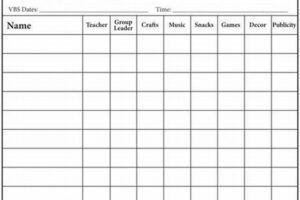Table of Contents
Welcome to the ultimate guide on recording volunteer hours! Whether you’re a passionate volunteer looking to track your contributions or an organization seeking an efficient way to manage volunteer data, this article has you covered. In this comprehensive guide, we’ll dive into the importance of recording volunteer hours, explore the various methods for doing so, and provide practical tips to make the process as smooth as possible.
Documenting volunteer hours is not just a formality; it has immense value. It allows organizations to accurately measure their impact, showcase their accomplishments to stakeholders, and demonstrate the dedication of their volunteers. For volunteers, keeping a record of their contributions serves as a valuable testament to their commitment and a source of motivation to continue making a difference.
Now that we’ve established the significance of recording volunteer hours, let’s delve into the practical aspects of the process. Whether you prefer manual or digital methods, we’ll guide you through each step, ensuring you capture accurate and meaningful data.
How to Record Volunteer Hours
To effectively track and manage volunteer hours, consider the following key points:
- Choose a Method: Manual or Digital
- Create a System: Consistent and Easy to Use
- Provide Clear Instructions: To Volunteers
- Use Volunteer Management Software: For Efficiency
- Keep Track of Hours: Accurately and Regularly
- Include Relevant Details: Date, Time, Location
- Review and Verify: Hours Reported
- Provide Regular Feedback: To Volunteers
- Celebrate Achievements: Recognize Volunteer Contributions
By following these simple yet effective tips, you can ensure that volunteer hours are recorded accurately, consistently, and in a manner that benefits both volunteers and organizations.
Choose a Method: Manual or Digital
The first step in recording volunteer hours is to select a method that suits your organization’s needs and resources. There are two primary options:
- Manual Method:
This involves using paper-based forms or spreadsheets to track volunteer hours. Volunteers fill out forms or log their hours in a spreadsheet, which is then collected and managed by the organization.
- Digital Method:
This involves using online tools, volunteer management software, or mobile apps to record volunteer hours. Volunteers can log their hours directly into the system, and the data is stored and managed electronically.
Each method has its own advantages and disadvantages. Manual methods are simpler to set up and may be more accessible to organizations with limited resources. However, they can be more time-consuming and prone to errors. Digital methods offer greater efficiency, accuracy, and the ability to easily generate reports and analyze data. However, they may require an initial investment in technology and training.
Create a System: Consistent and Easy to Use
Once you have chosen a method for recording volunteer hours, it is important to establish a system that is consistent and easy for volunteers to use. This will ensure that hours are recorded accurately and completely, and that volunteers have a positive experience when logging their hours.
Here are some tips for creating a consistent and easy-to-use system:
- Develop Clear Guidelines: Create a clear and concise set of instructions for volunteers on how to record their hours. This should include information on what activities qualify as volunteer service, how to log hours, and the format for submitting hours.
- Provide Training: Offer training to volunteers on how to use the system, especially if you are using a digital method. This will help volunteers understand the process and ensure that they are logging their hours correctly.
- Make It Accessible: Make sure that the system is easily accessible to volunteers. If you are using a digital method, ensure that the platform is user-friendly and that volunteers have the necessary devices and internet access.
- Keep It Simple: The system should be simple and straightforward to use. Avoid complex or confusing processes that may discourage volunteers from logging their hours.
By creating a system that is consistent and easy to use, you can encourage volunteers to accurately and consistently log their hours, leading to more reliable and valuable data for your organization.
Provide Clear Instructions: To Volunteers
Volunteers are the backbone of many organizations, and it is important to make it as easy as possible for them to log their hours. Providing clear and concise instructions is essential for ensuring that volunteers accurately and consistently record their time.
- Define Volunteer Activities: Clearly define what activities qualify as volunteer service for your organization. This may include both direct service activities (e.g., tutoring students, serving meals at a soup kitchen) and indirect service activities (e.g., attending training sessions, preparing materials for events).
- Specify Logging Requirements: Provide specific instructions on how volunteers should log their hours. This should include information on what information to include (e.g., date, time, location, activity description) and the format for submitting hours (e.g., paper form, online form, mobile app).
- Offer Examples and Templates: Provide examples or templates to help volunteers understand how to correctly log their hours. This can be especially helpful for volunteers who are new to volunteering or who are unfamiliar with the organization’s specific requirements.
- Make Instructions Easily Accessible: Make the instructions easily accessible to volunteers. Include them in volunteer orientation materials, post them on your organization’s website, and provide them to volunteers upon request.
By providing clear and concise instructions, you can help volunteers accurately and consistently log their hours, leading to more reliable and valuable data for your organization.
Use Volunteer Management Software: For Efficiency
Volunteer management software can be a powerful tool for streamlining the process of recording volunteer hours. These software platforms offer a range of features that can save time, improve accuracy, and provide valuable insights.
- Centralized Data: Volunteer management software provides a central location to store and manage all volunteer data, including hours, activities, and contact information.
- Online Logging: Volunteers can log their hours directly into the software, eliminating the need for paper forms or manual data entry.
- Automated Reminders: The software can send automated reminders to volunteers to log their hours, ensuring that hours are recorded accurately and on time.
- Reporting and Analytics: Volunteer management software often includes reporting and analytics features that allow organizations to track volunteer trends, measure the impact of their programs, and generate reports for stakeholders.
By using volunteer management software, organizations can streamline the process of recording volunteer hours, improve the accuracy of their data, and gain valuable insights into their volunteer programs.
Keep Track of Hours: Accurately and Regularly
Accurate and regular tracking of volunteer hours is essential for organizations to effectively manage their volunteer programs and demonstrate the impact of their work. Here are some tips for keeping track of hours accurately and regularly:
Encourage Volunteers to Log Hours Promptly: Encourage volunteers to log their hours as soon as possible after completing their service. This will help to ensure that hours are recorded accurately and completely.
Provide Tools and Resources: Provide volunteers with the tools and resources they need to easily log their hours. This may include access to online logging platforms, mobile apps, or paper forms.
Review and Verify Hours: Regularly review and verify the hours that volunteers have logged. This can be done by checking for inconsistencies or errors, and by following up with volunteers to confirm the accuracy of their hours.
Maintain Clear Records: Maintain clear and organized records of volunteer hours. This may include digital spreadsheets, volunteer management software, or paper files. Ensure that records are easily accessible and secure.
By following these tips, organizations can ensure that volunteer hours are tracked accurately and regularly, providing valuable data for reporting, recognition, and impact measurement.
Include Relevant Details: Date, Time, Location
When recording volunteer hours, it is important to include relevant details such as the date, time, and location of the volunteer service. This information is essential for accurately tracking hours and understanding the scope of volunteer contributions.
Date: The date of the volunteer service should be recorded accurately. This information is important for tracking volunteer trends, identifying peak volunteer periods, and ensuring that volunteers are recognized for their contributions in a timely manner.
Time: The start and end times of the volunteer service should be recorded. This information is necessary for calculating the total number of hours served by each volunteer and for scheduling volunteers effectively.
Location: The location where the volunteer service took place should be recorded. This information can be used to track the geographic distribution of volunteer activities, identify areas where more volunteers are needed, and coordinate volunteer efforts with other organizations.
By including relevant details such as the date, time, and location of the volunteer service, organizations can ensure that volunteer hours are recorded accurately and comprehensively, providing valuable data for reporting, recognition, and impact measurement.
Review and Verify: Hours Reported
Once volunteers have logged their hours, it is important to review and verify the accuracy of the reported hours. This process ensures that the data collected is reliable and can be used for decision-making, reporting, and recognition purposes.
Regular Reviews: Regularly review volunteer hours to identify any inconsistencies or errors. This can be done by comparing hours reported by volunteers with other records, such as attendance sheets or project logs.
Volunteer Validation: Implement a system for volunteers to validate their reported hours. This can be done through online platforms, mobile apps, or paper forms. By requiring volunteers to confirm the accuracy of their hours, organizations can minimize errors and ensure the integrity of the data.
Follow-Up with Volunteers: In cases where there are discrepancies or concerns about the accuracy of reported hours, follow up with volunteers to clarify the details. Open communication and a collaborative approach can help to resolve any issues and ensure that hours are recorded accurately.
By reviewing and verifying volunteer hours, organizations can ensure that the data they collect is accurate and reliable, allowing them to effectively manage their volunteer programs, measure their impact, and recognize the contributions of their volunteers.
Provide Regular Feedback: To Volunteers
Providing regular feedback to volunteers is crucial for maintaining their engagement, motivation, and satisfaction. Feedback allows volunteers to understand their impact, identify areas for improvement, and feel valued and appreciated.
Timely Feedback: Provide feedback to volunteers in a timely manner, ideally soon after they have completed their service. This demonstrates that their contributions are valued and that the organization is paying attention to their efforts.
Personalized Feedback: Tailor feedback to each volunteer’s individual contributions and performance. Highlight specific actions, skills, or behaviors that were particularly valuable or in need of improvement.
Positive Reinforcement: Focus on positive feedback whenever possible. Recognize and celebrate volunteers’ achievements, dedication, and commitment. Positive feedback can boost morale and encourage volunteers to continue their involvement.
Constructive Feedback: When providing constructive feedback, focus on specific behaviors or areas for improvement rather than making general or personal criticisms. Offer suggestions and support to help volunteers develop their skills and knowledge.
Open Communication: Encourage open communication and dialogue between volunteers and program coordinators or supervisors. Create opportunities for volunteers to provide feedback on their experiences and suggestions for improvement.
By providing regular feedback to volunteers, organizations can foster a culture of appreciation, recognition, and continuous improvement, leading to a more engaged and motivated volunteer workforce.
Celebrate Achievements: Recognize Volunteer Contributions
Recognizing and celebrating the achievements of volunteers is an essential part of volunteer management. It shows volunteers that their contributions are valued, motivates them to continue their involvement, and attracts new volunteers to the organization.
- Public Recognition: Publicly recognize volunteers’ contributions through social media, newsletters, annual reports, or local media outlets. Share stories of their impact and highlight their dedication and commitment.
- Volunteer Awards: Establish volunteer awards or recognition programs to honor outstanding volunteers. These awards can be presented at annual events, volunteer appreciation ceremonies, or other special occasions.
- Certificates of Appreciation: Provide volunteers with certificates of appreciation or personalized thank-you notes to express gratitude for their service. These tangible tokens of appreciation can be displayed in homes or workplaces.
- Volunteer Appreciation Events: Organize volunteer appreciation events, such as luncheons, dinners, or outings, to celebrate volunteers’ contributions and provide opportunities for them to socialize and connect with each other.
By celebrating achievements and recognizing volunteer contributions, organizations can create a culture of appreciation and recognition that fosters volunteer engagement, satisfaction, and retention.
FAQ
Have questions about recording volunteer hours? Here are some frequently asked questions and answers to help you:
Question 1: Why is it important to record volunteer hours?
Answer 1: Recording volunteer hours is important for several reasons. It allows organizations to accurately track the contributions of their volunteers, measure the impact of their programs, and demonstrate the value of volunteerism to stakeholders. For volunteers, keeping a record of their hours provides a valuable testament to their commitment and can be used for personal or professional recognition.
Question 2: How can I record my volunteer hours?
Answer 2: There are two main methods for recording volunteer hours: manual and digital. Manual methods involve using paper forms or spreadsheets, while digital methods utilize online platforms, volunteer management software, or mobile apps. Choose the method that best suits your needs and resources.
Question 3: What information should I include when recording my volunteer hours?
Answer 3: When recording your volunteer hours, be sure to include the following information: date, time, location, activity description, and any relevant details about the service you provided.
Question 4: How often should I submit my volunteer hours?
Answer 4: The frequency with which you submit your volunteer hours may vary depending on the organization’s requirements. Some organizations prefer volunteers to submit their hours weekly, while others may allow for monthly or quarterly submissions. Check with the organization to determine their preferred submission schedule.
Question 5: What if I forget to record my volunteer hours?
Answer 5: If you forget to record your volunteer hours, contact the organization as soon as possible to report your hours. They may have a process in place for recording late or missed hours.
Question 6: How can I get recognition for my volunteer hours?
Answer 6: Many organizations offer recognition programs to volunteers who contribute a certain number of hours. These programs may include certificates, awards, or other forms of recognition. Check with the organization to learn about their volunteer recognition program.
Remember, recording volunteer hours is a collaborative effort between volunteers and organizations. By working together, we can ensure that volunteer contributions are accurately tracked and recognized, leading to a more impactful and rewarding volunteer experience for all.
Now that you have a better understanding of how to record volunteer hours, here are some additional tips for making the process as smooth and efficient as possible:
Tips
Here are some practical tips to help volunteers record their hours smoothly and efficiently:
Tip 1: Choose the Right Method:
Select the method for recording hours that best suits your preferences and the organization’s requirements. If you prefer a traditional approach, consider using paper forms or spreadsheets. If you’re comfortable with technology, explore online platforms or mobile apps designed for volunteer hour tracking.
Tip 2: Keep Detailed Records:
When logging your hours, provide as much detail as possible. Include the date, time, location, activity description, and any additional information that might be relevant to the organization. Accurate and detailed records will make it easier to track your contributions and ensure that your efforts are properly recognized.
Tip 3: Be Consistent:
Establish a routine for recording your volunteer hours. Whether you choose to log your hours daily, weekly, or monthly, consistency is key. This will help you avoid forgetting to record your hours and ensure that your contributions are accurately tracked.
Tip 4: Communicate with the Organization:
Maintain open communication with the organization you’re volunteering for. If you have any questions or concerns about recording your hours, don’t hesitate to reach out to the appropriate staff member or volunteer coordinator. They can provide guidance and ensure that your hours are properly recorded and recognized.
By following these tips, you can make the process of recording volunteer hours seamless and contribute to the organization’s accurate tracking of volunteer contributions. Your efforts will be duly recognized, and together, you can make a positive impact in the community.
Remember that recording volunteer hours is not just about fulfilling a requirement; it’s about valuing the contributions of volunteers and showcasing the impact of their collective efforts. By embracing these tips and actively participating in the recording process, you’re helping to strengthen the organization’s volunteer program and making a difference in the lives of those you serve.
Conclusion
As we come to the end of our exploration of recording volunteer hours, it’s important to reflect on the significance of volunteer contributions and the role we play in accurately tracking their efforts. Volunteers are the backbone of many organizations, dedicating their time, skills, and passion to make a positive impact in their communities.
Through this guide, we’ve emphasized the importance of choosing the right method, providing clear instructions, utilizing volunteer management software, keeping track of hours accurately, and recognizing volunteer achievements. By following these steps, organizations can create a streamlined and efficient process for recording volunteer hours, ensuring that the contributions of these dedicated individuals are properly valued and recognized.
Remember, recording volunteer hours is not just a formality; it’s a way of honoring the commitment and dedication of those who give their time and energy to make the world a better place. As volunteers, we have the responsibility to accurately log our hours, providing valuable data that helps organizations measure their impact and demonstrate the true value of volunteerism.
Together, let’s continue to celebrate the spirit of volunteerism and work towards creating a culture where volunteer contributions are recognized, appreciated, and celebrated. Every hour counts, and every volunteer makes a difference.






